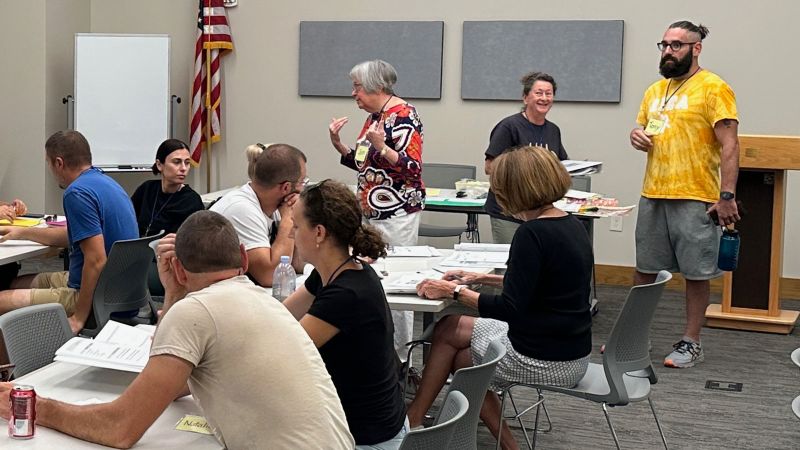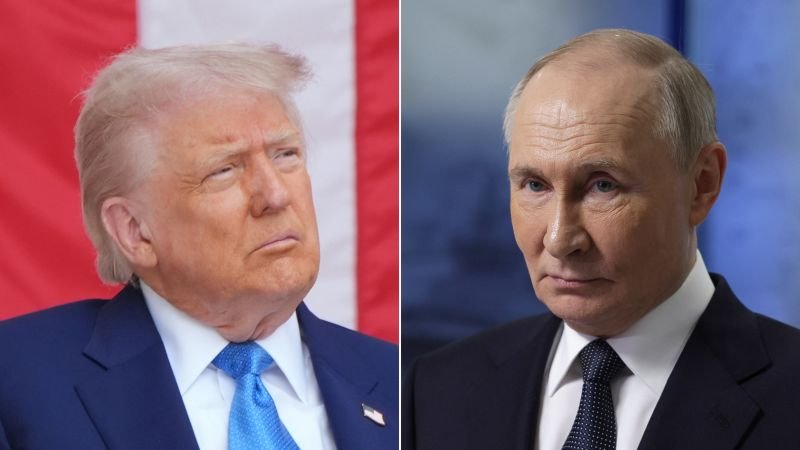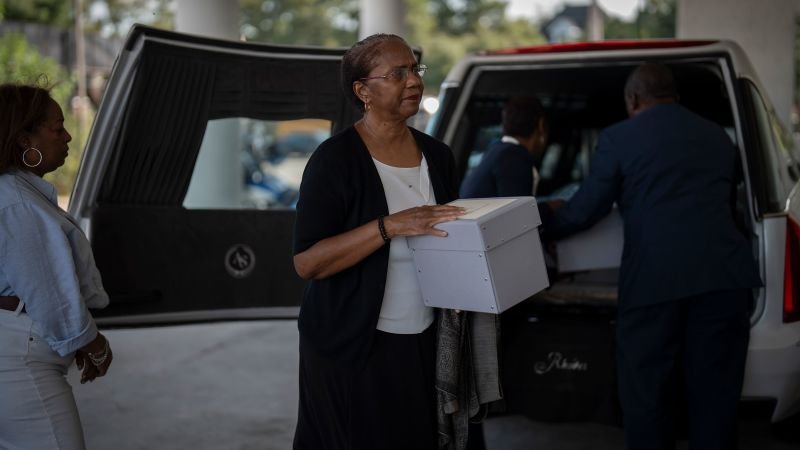CNN
—
Sasha had only heard a little about South Carolina, and even less about the town of Hartsville, when he and his family moved there in September 2022.
They were forced to suddenly leave behind their life in Kyiv because of the war with Russia. They are not the only Ukrainians in the “small, rural community” where they have been welcomed and begun to rebuild their lives.
“For me, the United States, it was like a fortress of democracy, of freedom, of opportunities, and I thought, finally, finally, I’m in the place where I can begin my life all over again,” Sasha, who is not using his last name for fear of reprisal, told CNN.
Sasha, his wife and his young daughter are among the approximately 280,000 Ukrainians who have relocated to the United States through “Uniting for Ukraine” (U4U), a US government humanitarian parole program that allowed private US citizens to sponsor and help support Ukrainian refugees.
Now, Sasha’s family and scores of others who came to the US under the U4U program fear their lives may once again be uprooted, as decisions on parole extensions, temporary protected status, and work authorizations have been paused amid the Trump administration’s sweeping changes to the immigration system.
“This really could be catastrophic, not just for the Ukrainian families, but for our community,” said Curtis Lee, Sasha’s sponsor and a member of “Carolinas for Ukraine.”
A spokesperson for the US Citizenship and Immigration Services said there is “an administrative hold on all pending USCIS Benefit Requests filed by Parolees Under the Uniting for Ukraine (U4U) Process.”
“This is pending the completion of additional vetting to identify any fraud, public safety, or national security concerns,” they said in a statement to CNN. “USCIS is committed to safeguarding the integrity of our nation’s immigration system and carrying out President Trump and Secretary Noem’s mandate to make America safe again.”
For Liana Avetisian and Alina Mirzoian, Ukrainian cousins who settled with their family in DeWitt, Iowa, that “administrative hold” could spell the end to their American dream. They paid thousands in application fees through the immigration system but have not yet received temporary protected status (TPS) and the administration suspended processing humanitarian parole extensions before theirs were granted, their sponsor Angela Boelens explained. The lack of action threatens to leave them in limbo.
Avetisian said she feels betrayed. Boelens, who is also the president of Iowa Newcomer Community & Exchange (IA NICE), said the community feels betrayed too.
“This community feels absolutely devastated. We don’t know what we’re going to do with all the home mortgages here in town, the people who are losing their valuable employees, their friends in school are crying. They had to hire a counselor at the school locally to help the children understand some of what’s going on,” she told CNN. Boelens explained that the community “had raised half a million dollars to buy transitional houses” for newcomers to stay in. Some have since been able to buy houses of their own.
“This entire community feels really hurt, and this is a very, very red community, they’re in disbelief,” she said. “So, they’ll never step up again and help people like they did, because they also feel like they’ve been betrayed.”
Sam Heer, who employs four Ukrainian workers including Avetisian and Mirzoian, told CNN “it would hurt” if they had to leave.
Heer said the community is committed to helping them with their bills. He applied for work visas for the four of them, but he doesn’t “have a good feel” for the status of those permits, he said.
“They’re great assets to our community, they’re hard working. They want to learn. They want to provide for their families,” he said.
The town of Hartsville is also bracing for the potential impact if their Ukrainian neighbors cannot stay.
“They have become such an integral part of our community,” Lee told CNN, noting at least one company that relies on skilled labor from resettled Ukrainians. “People just embraced it. And it’s going to tear us apart if that happens.”
Lee warned that the US government “doing nothing will actually force many of them to leave.”
“They should at least give them some certainty,” he said, “even if they just kicked the can down the road and gave them all a blanket parole and work authorization until after the midterms.”
Lee, who said he is a registered Republican, believes the U4U program aligns with the Trump administration’s priorities. Because of the sponsorship aspect, it has a relatively low cost for the US government. Boelens described the program as “the right kind of refugee program, handled perfectly.”
“The US is not on the hook for tickets,” Lee noted. “We are basically taking on the burden of resettlement,” he noted.
“Little towns like mine, we need to have people coming in, just from a pure population standpoint, and especially ones that are going to bring additional talent and diversity,” he said.
The Ukrainians who came to the US through U4U “followed the legal process.”
“They went through the background checks. They’ve done everything that they’re supposed to do. They follow the laws. They’re paying their taxes,” Lee said. “For all this talk of, well, you know, we’re going to get rid of the immigrants that supposedly aren’t good for the US – that’s not this group.”
Uncertainty and fear
For the Ukrainians who may be affected, the specter of uprooting their lives again has already been traumatizing.
“I feel really bad about the situation,” said Mirzoian, telling CNN she feels “nervous all the time.”
Avetisian who came with her husband as well as her now 14-year-old daughter, and Mirzoian came to DeWitt in May 2023 from near Kyiv. They had returned to Ukraine after relocating for two months to Bulgaria at the start of Russia’s war, but then in autumn 2022 found that life there was “harder and more dangerous” amid Moscow’s relentless attacks on critical infrastructure.
“No light, electricity, and it was cold, and we were sitting in our houses with candles,” she explained.
When they came to DeWitt, they were welcomed into the community, where a couple of other Ukrainian families had also settled.
“People here are all so good. They really helped us,” Avetisian told CNN. Now, if they are made to leave, they don’t feel that they can return to Ukraine.

“I don’t want to take my 14-year-old daughter and go to another country and start there and learn a new language and make new friends and look for a new house. It’s very hard,” she said.
Sasha said he feels like he’s back in the “worst period” of his life during the war, where he felt like he was not in control of his life.
His family fled Kyiv with just minutes to pack their suitcases after explosions near their home and separated for several months – his wife and daughter went to Italy while he remained helping build shelters in Ukraine. He heard about the U4U program through a friend, and the family quickly made the decision to apply so they could be together.
They were “a little bit confused and scared because we don’t know where we’re going, we didn’t know what to expect,” said Sasha.
Speaking over video chat with Lee and his wife, Barbara, who were their sponsors, helped assuage some of those fears, he said. Their concerns were further eased when they arrived.
Now, Sasha has restarted his construction business in Hartsville, building affordable tiny houses out of shipping containers.
“He’s invested a lot, not just in time and effort, but he has a rental contract for the place he’s using to build stuff, he’s purchased a lot of equipment,” Lee explained.
“I’m trying to not think about” possibly having to leave the US, Sasha said. He recalled that his daughter had just begun to talk when they relocated to the US after having to move several times.
“She had the same question all the time, ‘Daddy, where is our home?’ When you can’t answer this question, I can’t even explain how it feels,” he told CNN. “A couple months ago, she started to call this place where we live in, she started to call it home.”


























